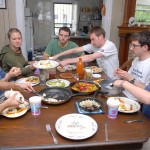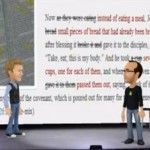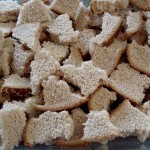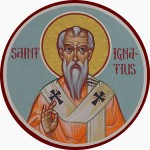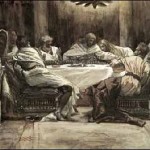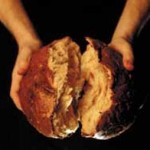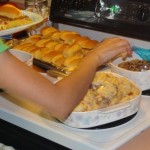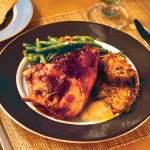The baptism of Jon, from where did it come?
No. There is no typo in the title of this post. And, yes, it is a take-off of Matthew 21:25. However, I am not talking about “John the Baptist.”
Instead, I’m talking about Jon from “Jon’s Journey.” He has started a series on the topic of “baptism” that promises to be very good.
So far, he’s published two posts: “Baptism Questions” and “Baptism without Water.”
Here is part of his latest post:
Could it be that John baptized with water, but Jesus was going to wash/immerse/dye people with the Holy Spirit and fire (and not necessarily with water). John doesn’t say Jesus will baptize with water and also baptize with the Holy Spirit.
I did a similar study of baptism a few years ago, covering the use of the term in the LXX (Septuagint), Philo, Josephus, and the New Testament. Unfortunately, the Greek text in those posts was corrupted during a database upgrade, so much of the series is indecipherable.
Baptism is definitely an interesting study, and followers of Jesus come to different conclusions today. I’m looking forward to reading the rest of Jon’s study.
I’d love to hear your thoughts on baptism.
Replay: Meeting Around the Table of the Lord
Two years ago, I wrote a post called “Meeting Around the Table of the Lord.” The described our church gathering on Easter morning, when we gathered together “to break bread.” The Lord’s Supper was not a piece a bread and sip of juice tacked on the end of our meeting. Instead, our meeting was centered on sharing a meal together.
Here is the post:
——————————————
Meeting Around the Table of the Lord
I’ve written several times on this blog about the Lord’s Supper, or Communion, or the Eucharist, or whatever you want to call it. I’ve talked about how the Lord’s Supper is described as a meal in Scripture. I’ve also written about how we usually eat together when we gather with the church.
Still, though, there has usually been a disconnect between our meeting together, the bread/cup, and eating a meal together. I’ve often thought about how this disconnect could be remedied.
Last Sunday – yes, Easter Sunday – we had an opportunity to meet in a different way that brought together the bread/cup, a meal, and our whole meeting.
We began by meeting around tables. People knew that we would be eating together, so they brought food with them – rows of crock-pots, casseroles, dishes, and other assorted goodies. We then milled around and talked and discussed our week and different things like that.
Eventually, one of our brothers started leading us in some singing. Since it was Easter, and since we were planning to study the resurrection passage in Matthew 28:1-17, we sang several songs about the resurrection. We’re also reading through Acts together, so at one point two brothers read from Acts 18, one reading the first half of the chapter, and another reading the second half of the chapter.
After a few songs, we talked about the significance of the bread and breaking the bread. We talked about how the bread signified both Jesus’ broken body as a sacrifice on our behalf, and how the broken bread signifies the beginning of our meal with Jesus as our risen, living host. It remains his table, not ours.
Since I was planning to lead our discussion of Matthew 28:1-17 that morning, I suggested several questions that people could discuss together around their tables as they were eating.
Then, after we broke and shared the loaf of bread together, we began eating. As we ate, we discussed the questions that I suggested. After most people had finished eating, and while a few were finishing dessert, I asked each table (we had five tables) to share something about their discussion.
Next, I read and led a discussion of Matthew 28:1-17. Of course, our discussion around the table led into this teaching/discussion. Since people had already been talking about the issues in smaller groups, it seemed our larger group discussion was even more open and focused on the topic.
Finally, after a few announcements, we passed around the “cup” (actually a bottle of grape juice) and shared this together.
There are many ways for the church to meet together. I really appreciated the way we met together last Sunday. I liked the way that our meeting format combined the bread, cup, meal, and teaching all together in a unified format. The bread/cup and meal were not “tacked on” to the meeting, but were an integral part of our meeting together.
The Lord’s Supper at the Golden Corral Buffet?
Did you see this comment that Art (from “Church Task Force“) left here yesterday? He left his comment on an old “Scripture… As We Live It” re-mix of a passage related to Jesus’ last meal with his followers before he was crucified.
Well, it turns out that Art’s comment shows that he went the extra mile! He made an animated video based on that re-mix.
The video would be funny… if it were not so true.
Here is Art’s video:
I have to admit, though, that sharing the Lord’s Supper at the Golden Corral buffet sounds awesome.
Thanks, Art!
(UPDATE: Art posted an updated video with a new ending here.)
The Lord’s Supper, Communion, or Eucharist in Jeremiah
A few years ago, I came to the conclusion that the phrase “breaking bread” as used by the New Testament authors did not refer to what is commonly called “The Lord’s Supper” (or “Communion” or “The Eucharist”) today. (I’m using all three phrases “The Lord’s Supper,” “Communion,” and “Eucharist” because different Christian traditions use different phrases to refer to the same thing.) In other words, “breaking bread” did not refer to small pieces of bread. Instead, I believe that “breaking bread” is an idiom that refers to sharing a meal together.
Idioms are figures of speech whose meanings are not made up by the normal meanings of the components of the phrase. For example, the phrase “an axe to grind,” does not refer to an actual wood-chopping tool nor does it refer to sharpening that tool or anything else. Similarly, if someone “goes out on a limb,” they may be nowhere near a tree. These are idioms whose meanings are not made up by the component meanings.
Now, idioms are difficult to decipher. Unless we know that something is an idiom, or unless some writing explains the idiom for us, we may think that the idiom refers to what is literally described in the phrase.
There is a passage in Jeremiah (yes, in the Old Testament) that can help us see the relationship between the phrase “breaking bread” and a shared meal. God had just told the prophet that destruction was going to come to his land. Now, in preparation, he tells Jeremiah not to marry or mourn for the dead. In the part about mourning, he says this:
Both great and small shall die in this land. They shall not be buried, and no one shall lament for them or cut himself or make himself bald for them. No one shall break bread for the mourner, to comfort him for the dead, nor shall anyone give him the cup of consolation to drink for his father or his mother. You shall not go into the house of feasting to sit with them, to eat and drink. (Jeremiah 16:6-8 ESV)
In the Greek translation of Jeremiah (the LXX) the phrase translated “break bread” is one of the same phrases found in the New Testament which is often seen to refer specifically to “The Lord’s Supper,” “Communion,” or “Eucharist.” You can find very similar phrases in Acts 2:46; Acts 20:7,11; and 1 Corinthians 10:16. The noun form of the verb “break” is used along with “bread” in Acts 2:42. The same phrases are used in the Gospel accounts of the feeding of the five thousand and four thousand and when Jesus interacts with two of his disciples on the road to Emmaus. In other words, in the passages that are normally connected to some type of sacramental meaning in the bread and cup, the NT authors uses the same phrase found in Jeremiah 16:7.
Yet, in the Jeremiah passage, it is clear that a sacramental meal is NOT in view. It is a common meal. God tells the prophet not to share a meal with those who mourn. In fact, both the “breaking of bread” and the “cup of consolation/encouragement” are included as phrases which refer to eating a meal with those who are mourning. These are certainly not references to the Lord’s Supper, Communion, or the Eucharist. Instead, the phrases refer to sharing a meal.
(By the way, the Greek translation of the Old Testament was probably begun sometime in the 3rd century BC, or about 300 years before the New Testament was written. However, the translators started with the Torah – Genesis-Deuteronomy. Jeremiah was probably translated after that, closer to the date of the writing of the various New Testament letters. The same idiom “break bread” is found in the Hebrew text as well, which shows that the idiom has a much older beginning in that culture.)
If “breaking bread” refers to sharing a meal – which I think it does – then the church is missing something very important by limiting the scope of this phrase to some type of sacramental ritual referring only to little pieces of bread.
Replay: Following Ignatius instead of Scripture
Three years ago, I wrote a post called “Following Ignatius.” When I first read Ignatius’ letters, I remember being encouraged by his focus on the gospel. But, I was perplexed by the weight that he put on the monoepiscopacy (single bishop, multiple presbyters, and multiple deacons in each city). Ignatius admits that he did not learn this from any of the apostles or any other men, but it was instead revealed to him directly by the Holy Spirit. But, I don’t know why I was surprised by the focus Ignatius placed on the bishop, since I had seen that same focus in all the churches I’d ever been part of. Oh, they didn’t focus on the bishop… but on the “senior pastor.”
———————————-
Ignatius of Antioch was one of the earliest Christian writers following the apostles. He died sometime around 110 AD in Rome. After being arrested in Antioch, he was led to Rome through Asia Minor. On the way, he wrote seven letters, six to churches and one to Polycarp.
Ignatius was very interested in the gospel. Ignatius’ gospel was a literal interpretation of the historical events and persons surrounding the birth, life, death, burial, resurrection, and continuing ministry of Jesus Christ. His desire was to see Christians living in harmony with the one gospel.
In order to exhort Christians toward harmony with the one gospel, Ignatius also encouraged them toward a three-part church leadership structure that included one bishop, multiple elders, and multiple deacons per city.
Evangelicals are proud of the fact that we follow Scripture and not traditions such as those espoused by Ignatius. But, do we follow Ignatius over Scripture? You can judge for yourself…
By being subject to the bishop and the elders, you might be sanctified concerning all things. (Ign. Eph. 2.2b)
Let us make every effort then not to oppose the bishop in order that we might submit ourselves to God. (Ign. Eph. 5.3b)
Therefore, as the Lord did nothing without the Father, being united with him, neither by himself nor by the apostles, in the same way you must do nothing without the biship and the elders. (Ign. Mag. 7.1a)
The one who does anything without the bishop, the elders, and the deacons, such a man is not clean in his conscience. (Ign. Trall. 7.2b)
Let that Eucharist be considered proper which is either by the bishop or by the one he permits. (Ign. Smyr. 8.1b)
It is not proper to baptize or to have a “love feast” without the bishop. (Ign. Smyr. 8.2b)
The one who honors the bishop is honored by God; the one who does anything without the knowledge of the bishop serves (worships?) the devil. (Ign. Smyr. 9.1b)
It is fitting for men and women who marry to make there union by the approval of the bishop. (Ign. Pol. 5.2b)
These are only a few of the passages. I left out passages where Ignatius said that same thing to different churches. So, according to Ignatius, believers should do nothing with the consent of the bishop and elders. In fact, those who do anything without their leaders obviously have impure motives (unclean conscience). No one should have a love feast (Eucharist, communion) or baptize without the bishop’s approval. No one should get married without the bishop’s approval. If believers stay within the bishop’s will, then they are sanctified. If they move outside the bishop’s will, then they are in trouble, actually going against God himself to serve the devil.
Change “bishop” to “senior pastor”, and I think this fits very closely with many modern teachings concerning church leadership. You can especially find these types of teachings under topic of spiritual “covering”. But, I don’t think you’ll find these in Scripture.
Are we willing to admit that in many of our leadership concepts and practices in the church we follow Ignatius more closely than we follow Scripture?
Comment Highlight: The Lord’s Supper and Passover
I enjoyed a discussion that I had with Mike on my post “The Lord’s Supper in Context.” The discussion focused on the connection between the Lord’s Supper and the Passover.
Unfortunately, it took several comments from Mike before I understood what he was trying to get across. (Yes, sometimes – perhaps often, depending on who you ask – I’m a bit slow.) So, I’m going to post a few of Mike’s comments, then both of our comments as we zoom in on this topic in the discussion.
Here are the relevant comments:
Mike: I don’t believe that “breaking bread” was specifically the Lords Supper
It appears to me that Jesus said that when we eat and drink the cup (to me seeming specific to the passover)
Paul also solidified this in 1 cor 11
I do however think a meal amongst brethren was a big part of fellowship that seems to be all but lost among modern day gatherings of saints
———————————
Mike: Alan I fully agree and desire to encourage the meal daily weekly and whenever
I live in a part of the state where people are so churchified that those things aren’t normal because its all about Sunday and everything else is extracurricular
Its sad really
Many times I feel compelled to go back to religious edifices but just can’t bring myself to do it because I just want to yell WHY IS EVERYONE SILENT
I never meant though that the corinthians were not eating the right stuff as much as I don’t believe that the Lords supper was ever a monthly or weekly event as much as something commerating the Lord as the passover lamb at passover
But that’s just speculation all based on the “this cup…..this bread” thing
———————————
Mike: Forgive me if no one else saw that either but that is what I was referring to that the Lords supper seems to be the new covenant passover meal
———————————
Alan: The last supper that Jesus ate with his followers before he was crucified was certainly one of the Passover week meals. Whether it was THE Passover feast or not is still being discussed and debated and argued. Either way, though, the authors of Scripture do not emphasize the Passover features, and when Paul or Jude write about the shared meals among the church, they don’t mention the Passover at all. While this might be excused for a Jewish audience (since they would certainly understand the significance of Passover), a Gentile audience would need to have things explained. 1 Corinthians 11 would be the perfect place for Paul to explain that the Gentile believers in Corinth were not correctly observing the Passover.
———————————
Mike: I think that paul expressing “this cup” was letting the corinthians know it was the passover
Just cause they were gentiles doesn’t mean they didn’t know the passover
As for the jude thing it appears that the love feast could be nothing more than a charitable feast for those less fortunate
I say this cause it wasn’t called the Lords supper and there was no mention of “this cup”
I think there is a distinction between the Lords supper and regular communions
Is the word communion IN the bible?
BTW I don’t think this has any concrete conclusion just like the pagan holidays vs jewish holy days thing
And though I 100% believe we should observe Gods Holy days over things like christmas easter and the such I don’t think any of that is salvivic
I hope we are just sharpening each other and growing closer to Christ together
———————————
Alan: I appreciate the discussion about the relationship between the Lord’s Supper / Communion / Eucharist and the Passover. I’m wondering, in what way(s) do you (all) think Jesus continued the meal as the Passover and in what way(s) do you think he changed it?
———————————
Mike: I would say that the Lords supper appears to be the “new” passover for it symbolizes a more universal complete passover
I don’t think anything changed as much as things are now complete in Him
Its kind of all still speculation to a point to sayy 100% without a doubt
I do however believe that the Lords Supper is the new covenant passover not to be confused with daily/regular breaking of bread amongst the saints
Even where the bible says about coming together on the first day of the week and breaking bread as a custom I believe the point of that statement in scripture is not the when (first day of the week) of coming together but the what (breaking bread) that is the “custom” of the coming together of the saints
now there is also a mention of sacrificing to idols (which I can’t imagine they did every day) in first cor 10 and the mention of the blood and body are in verse 16 and it seems to be in context of a certain religious event as opposed to something done often since paul (though speaking to gentiles) talks about israel (albeit in the flesh)
Now if we just pull 1 cor 10:16 out of context it may seem like a regular thing but in context it would appear it was comparing it to other sacrificial events both pagan and jewish
I have nothing specific to say about the term eucharist because I don’t know why we have to have a non-biblical term to describe something when we have many biblical things to do so……..just sayin
Communion (coming together in Christ and having all things in common) is a great ideology that no one desires to live
Put that in scripture……..how we live it =D
That’s all I got for now
Ill probably think of more as the pot stirs I’m sure
———————————
Alan: I re-read the passage in Exodus describing the purposes and practices associated with the Passover festival week. I didn’t see anything about the Messiah. Do you know if that’s somewhere else in the Old Testament?
———————————
Mike: Well since Jesus is our passover lamb and we are partaking of Him I think everything in the passover speaks of the messiah
Have you ever partaken in a messianic sedar?
Its awesom the correlation between the whole exodus account and the story of our salvation in the messiah
———————————
Alan: Yes, I’m familiar with the Seder. Do you know anything about its history or development?
———————————
Mike: yes alan I understand that the sedar is not strictly jewish and specifically from the exodus account
Its kind of like christmas and easter
However through that practice (when coupled with scripture) we can walk through the exodus and passing over of the firstborns
However we must admit that the Passover is pointing to christ
It is also good to understand that much of the laws of Judaism bear striking resemblance to the code of Hammurabi
This is why I try not to be too dogmatic about my views on Easter and Christmas
———————————
Alan: I understand. The synagogue is similar. It was an inter-testimental development of Judaism, but Jesus used the synagogue, and the church began meeting in a similar way to the way the Jews met as the synagogue. In fact, both the similarities and the differences can tell us about what was important to the church.
I think the same would be true for the Passover. Both the similarities and the differences between the Last Supper / the shared church meals and the Passover (that had developed from Exodus) can tell us what was important to both Jesus and the early church. For example, if I’m correct that for the early church all shared meals were an expression of that Last Supper (Passover), then that is an expression that Christ (the awaited Messiah of the Passover) is now always present with them in every aspect of life.
———————————
Mike: Maybe this is part of what paul is talking about when he tells us not to judge people on these things
As far as feasts days seasons etc but rather to let people do to the Lord what they feel they are led to do even if its taking what they know and making it about Him
I fully agree with the synagogue thing and I try to explain that to people but its hard until you study it out for yourself to see that everyone had opportunity to teach speak etc and the way of the house to house church made it just that more personal
You know what my conclusion is?
Happy Passover brother =D
The Lord’s Supper in Context
Jeff at “Until All Have Heard” has written a great post about the Lord’s Supper called “Understanding the Lord’s Supper in its Historical Context.”
He steps through several passages in the New Testament to show that what we call “the Lord’s Supper” was a meal shared among the church. In the post, Jeff mentions Jude 1:12, Acts 27:33-36, Matthew 14:19-20, 1 Corinthians 11:29, Acts 20:7, and other passages.
His conclusion is well worth considering – whatever you think about the Lord’s Supper:
My hope and prayer for the church is that we would rediscover our dynamic New Testament roots and once again gather together on the first day of the week to break bread.
– We would share our food with each other and our spiritual gifts.
– We would linger long at the table and celebrate the Lord’s goodness in our lives and together “proclaim the Lord’s death until He comes.” (I Cor 11:26)
Now, I’m not concerned with only how we “gather together on the first day of the week,” but instead, how do we “break bread” together any time we come together?
Still, this is a great exhortation for the church.
What do you think?
Paul Celebrates the Lord’s Supper with Pagan Soldiers?
When you read commentaries, articles, essays, or blog posts concerning the Lord’s Supper / Communion / the Eucharist, you’ll find reference to terms like “give thanks” and “break bread.” Often, these terms are treated like technical terms that refer to the Lord’s Supper.
For example, many will point to Jesus’ last supper with his disciples before his crucifixion (in Matthew 26:26-28, Mark 14:22-24, and Luke 22:14-20) as a prefiguring of the Lord’s Supper. In these passages, we find phrases like “took break,” “blessed [the bread],” “broke [the bread],” and “gave [the bread] to his disciples.” Then, when the terms are found later in Scripture (in Acts, for example), then the author must be talking about the Lord’s Supper.
Thus, many point to Acts 2:42 as indicating that the early church partook of the Lord’s Supper when Luke writes:
And they devoted themselves to the apostles’ teaching and fellowship, to the breaking of bread and the prayers. (Acts 2:42 ESV)
Similarly, some say that Paul and those traveling with him shared the Lord’s Supper with the church in Troas:
On the first day of the week, when we were gathered together to break bread, Paul talked with them, intending to depart on the next day, and he prolonged his speech until midnight. (Acts 20:7 ESV)
But, there is a very interesting passage at the end of Acts that we should consider as well. This account takes place in the middle of a storm on a ship in the Mediterranean Sea. Luke writes:
As day was about to dawn, Paul urged them all to take some food, saying, “Today is the fourteenth day that you have continued in suspense and without food, having taken nothing. Therefore I urge you to take some food. It will give you strength, for not a hair is to perish from the head of any of you.” And when he had said these things, he took bread, and giving thanks to God in the presence of all he broke it and began to eat. Then they all were encouraged and ate some food themselves. (Acts 27:33-36 ESV)
Luke had told us a few sentences earlier that Paul was talking with the Roman centurion and soldiers (Acts 27:31), but it’s not hard to assume that he was talking with his own traveling companions and the sailors as well.
Notice that this account includes much of the technical language that we saw associated with the Last Supper (and the Lord’s Supper) previously: “took bread,” “gave thanks [for the bread],” and “broke [the bread].” And, yes, the term translated “gave thanks” is the same term from which we get the word “Eucharist.”
So, many argue about whether or not this represents the Lord’s Supper. Some suggest that it is, since the various technical phrases are used. Others suggest that it is not, since Paul shares it with pagan soldiers and sailors.
But, would Paul understand the problem like we do? Would he be concerned with whether or not he was “partaking in the Lord’s Supper”?
Instead, what if these technical terms simply mean that Jesus and Paul shared a meal with those around them? And, what if these same terms in other places in the New Testament simply pointed to a shared meal? (For example, see Acts 2:42, Acts 2:46, Acts 20:7, Acts 20:11, 1 Corinthians 10:16-17, 1 Corinthians 11:26-28)
If these words are technical terms that point to a special ordinance/sacrament/ritual and not to a common meal, then how do we explain what Paul was doing in Acts 27?
The Lord’s Supper/Communion/Eucharist as a Feast of Friends
Arthur at “The Voice Of One Crying Out In Suburbia” has been quoting from the book A Meal With Jesus by Tim Chester. His latest post is “The high point of our life together as the people of God.”
In this post, Arthur quotes several paragraphs from the book. This struck me as very close to what have I learned about meals and “the Lord’s Supper.” So, I’ve decided to quote a large part of what Arthur quoted.
(You can jump to Arthur’s post to read the rest of his quote.)
The bread and wine in the New Testament are part of a meal. Luke says of the Jerusalem church, “Breaking bread in their homes, they received their food with glad and generous hearts” (Acts 2:46). Commentators often can’t decide whether this refers to meals in general or Communion. That’s because we assume they’re two different things. We think of a meal taking place around a dining table at home while we think of Communion as a solemn rite in a church building. But in Jerusalem followers of Jesus ate meals together in their homes, eating bread, drinking wine, remembering Jesus, and celebrating the community he created through his death.
These were feasts of friends. Some in the church in Corinth were abusing the meals, but Paul doesn’t tell them to separate the bread and wine from the meal. Quite the opposite. He tells them to wait for one another so they can eat the meal together. Communion should be a feast of friends shared with laughter, tears, prayers, and stories. We celebrate the community life that God gives us through the cross and in the Spirit. We can’t celebrate it with heads bowed and eyes closed, alone in our private thoughts and strangely solitary even as we’re surrounded by other people.
When we recapture the Lord’s Supper as a feast of friends, celebrated as a meal in the presence of the Spirit, then it will becomes something we earnestly desire. It will become the high point of our life together as the people of God. In this sad and broken world, the Lord’s Supper is a moment of joy, because it is a moment of the future.
I love that phrase “feast of friends”… what the early church called “the love feast.”
There is no instance of the bread/wine of “The Lord’s Supper”/”Communion”/”Eucharist” being mentioned in the New Testament when it is not part of a meal. In fact, when you read the New Testament, the activity that early Christians took part in together more often than any other is eating meals together. (Note: They may have participated in some other activity more often, but that activity is not recorded as often.)
The church lost something important when the meal was reduced to a ritual. The church can regain what was lost by starting to eat meals together again.
The Lord’s Supper as a Meal
Four years ago, I wrote the post “The Lord’s Supper as a Meal?” (Yes, it included the question mark.) I was just beginning to write about the Lord’s Supper / Communion / Eucharist / the Agape Feast / the Lord’s Table. There are so many names for this important activity. But, in Scripture, they all point to the same thing: people eating a meal together. In this post, I trace through all those scriptural examples of “The Lord’s Supper”:
———————————————————————–
For the last two thousand years, believers have discussed the proper understanding of the elements (the bread and cup) of the Lord’s Supper. Some believe that the bread and cup become the literal, physical body and blood of Jesus Christ. Others believe that Jesus is spiritually present in the elements. Others believe there is no presence in the bread and cup, and that the Lord’s Supper is a remembrance.
All of these understandings of the Lord’s Supper revolve around the meaning of “is” when Jesus said, “This is my body… This is my blood.” (Matt 26:26; Mark 14:22-24; Luke 22:19-20; 1 Cor 11:24-25) Regardless of how we understand the bread and the cup, what about the meal itself? “The meal?” you ask. Yes, the meal. When the Lord’s Supper is mentioned in Scripture, it is mentioned in the context of a meal.
Consider these passages from the Gospels:
Now as they were eating, Jesus took bread, and after blessing it broke it and gave it to the disciples, and said, “Take, eat; this is my body.” And he took a cup, and when he had given thanks he gave it to them, saying, “Drink of it, all of you, for this is my blood of the covenant, which is poured out for many for the forgiveness of sins. I tell you I will not drink again of this fruit of the vine until that day when I drink it new with you in my Father’s kingdom.” (Matthew 26:26-29 ESV)
And as they were eating, he took bread, and after blessing it broke it and gave it to them, and said, “Take; this is my body.” And he took a cup, and when he had given thanks he gave it to them, and they all drank of it. And he said to them, “This is my blood of the covenant, which is poured out for many. Truly, I say to you, I will not drink again of the fruit of the vine until that day when I drink it new in the kingdom of God.” (Mark 14:22-25 ESV)
And he took bread, and when he had given thanks, he broke it and gave it to them, saying, “This is my body, which is given for you. Do this in remembrance of me.” And likewise the cup after they had eaten, saying, “This cup that is poured out for you is the new covenant in my blood. But behold, the hand of him who betrays me is with me on the table. For the Son of Man goes as it has been determined, but woe to that man by whom he is betrayed!” (Luke 22:19-22 ESV)
Even the Gospel of John mentions the meal, though the elements are not mentioned (unless we count the bread that is given to Judas):
Now before the Feast of the Passover, when Jesus knew that his hour had come to depart out of this world to the Father, having loved his own who were in the world, he loved them to the end. During supper, when the devil had already put it into the heart of Judas Iscariot, Simon’s son, to betray him, Jesus, knowing that the Father had given all things into his hands, and that he had come from God and was going back to God, rose from supper. He laid aside his outer garments, and taking a towel, tied it around his waist. (John 13:1-4 ESV)
What about in other parts of Scripture? How is the Lord’s Supper modeled among Christians in the New Testament after the resurrection and ascension? This is what Paul says in 1 Corinthians:
When you come together, it is not the Lord’s supper that you eat. For in eating, each one goes ahead with his own meal. One goes hungry, another gets drunk. What! Do you not have houses to eat and drink in? Or do you despise the church of God and humiliate those who have nothing? What shall I say to you? Shall I commend you in this? No, I will not. For I received from the Lord what I also delivered to you, that the Lord Jesus on the night when he was betrayed took bread, and when he had given thanks, he broke it, and said, “This is my body which is for you. Do this in remembrance of me.” In the same way also he took the cup, after supper, saying, “This cup is the new covenant in my blood. Do this, as often as you drink it, in remembrance of me.” For as often as you eat this bread and drink the cup, you proclaim the Lord’s death until he comes. (1 Corinthians 11:20-26 ESV)
Notice that the Corinthians were partaking of the Lord’s Supper as part of a meal. (This is the only use of the phrase “Lord’s Supper” in Scripture.) Paul does not condemn the meal. Instead, he condemns the Corinthians for not showing concern for others during the meal. From the repetition of “eat” and “drink” throughout this passage, the meal seems to be an integral part of the Lord’s Supper. (By the way, the word for “meal” in 1 Cor. 11:21 is the same word translated “supper” – as in the Lord’s Supper – in verse 20 and in John 13:2&4 and John 21:20.)
Similarly, Jude uses the plural word for “love” (αγάπαις) to specify the “love feasts” of the recipients of his letter (this is the only use of the phrase “Love Feast” in Scripture):
But these people blaspheme all that they do not understand, and they are destroyed by all that they, like unreasoning animals, understand instinctively. Woe to them! For they walked in the way of Cain and abandoned themselves for the sake of gain to Balaam’s error and perished in Korah’s rebellion. These are blemishes on your love feasts, as they feast with you without fear, looking after themselves; waterless clouds, swept along by winds; fruitless trees in late autumn, twice dead, uprooted; wild waves of the sea, casting up the foam of their own shame; wandering stars, for whom the gloom of utter darkness has been reserved forever. (Jude 1:10-13 ESV)
I realize that this is not a very happy passage to consider the Lord’s Supper, but again we see the Lord’s Supper associated with more than the elements. Here Jude warns his readers not to let blasphemers “feast with you” during “your love feasts”.
There are a few more passage that we should consider. In the three Gospel accounts of the Lord’s Supper, the authors use a certain formula that includes “taking”, “blessing”, and “breaking” the bread. These formulae are found in other passages that may or may not indicate that the people are partaking of the Lord’s Supper:
And they devoted themselves to the apostles’ teaching and fellowship, to the breaking of bread and the prayers. And awe came upon every soul, and many wonders and signs were being done through the apostles. And all who believed were together and had all things in common. And they were selling their possessions and belongings and distributing the proceeds to all, as any had need. And day by day, attending the temple together and breaking bread in their homes, they received their food with glad and generous hearts, praising God and having favor with all the people. And the Lord added to their number day by day those who were being saved. (Acts 2:42-27 ESV)
On the first day of the week, when we were gathered together to break bread, Paul talked with them, intending to depart on the next day, and he prolonged his speech until midnight. There were many lamps in the upper room where we were gathered. And a young man named Eutychus, sitting at the window, sank into a deep sleep as Paul talked still longer. And being overcome by sleep, he fell down from the third story and was taken up dead. But Paul went down and bent over him, and taking him in his arms, said, “Do not be alarmed, for his life is in him.” And when Paul had gone up and had broken bread and eaten, he conversed with them a long while, until daybreak, and so departed. (Acts 20:7-11 ESV)
As day was about to dawn, Paul urged them all to take some food, saying, “Today is the fourteenth day that you have continued in suspense and without food, having taken nothing. Therefore I urge you to take some food. It will give you strength, for not a hair is to perish from the head of any of you.” And when he had said these things, he took bread, and giving thanks to God in the presence of all he broke it and began to eat. Then they all were encouraged and ate some food themselves. (Acts 27:33-36 ESV)
The last passage (Acts 27) is most interesting. It includes all three of the formulaic expressions found in the Gospels. However, it is occuring on a ship, in a storm, with unbelievers. Perhaps this does not indicate a Lord’s Supper, but it does demonstrate how “breaking bread” can be used to indicate more than simply eating bread. Similarly, the passage in Acts 2 shows that “breaking bread” includes “food”, not just bread. There are other passages that use this formula, such as the feeding of the 4,000 and the feeding of the 5,000, in which the people are not partaking of the Lord’s Supper.
There is one more passage that is associated with the Lord’s Supper. This one is also from 1 Corinthians:
The cup of blessing that we bless, is it not a participation in the blood of Christ? The bread that we break, is it not a participation in the body of Christ? Because there is one bread, we who are many are one body, for we all partake of the one bread. Consider the people of Israel: are not those who eat the sacrifices participants in the altar? What do I imply then? That food offered to idols is anything, or that an idol is anything? No, I imply that what pagans sacrifice they offer to demons and not to God. I do not want you to be participants with demons. You cannot drink the cup of the Lord and the cup of demons. You cannot partake of the table of the Lord and the table of demons. (1 Corinthians 10:16-21 ESV)
In this passage, the elements of the Lord’s Supper are used to demonstrate our fellowship with Christ. As such, we cannot fellowship with both Christ and demons. (This is the only use of the phrase “Lord’s Table” in Scripture.) Although only bread and cup are mentioned in this passage, Paul mentions the fuller meal in less than a chapter (see above 1 Cor 11:20-26). Also, the word “table” can be used to indicate a meal, not a physical table (see Acts 16:34 where the Greek word “table” is translated “food” or “meal”).
By the way, if you are keeping score, here are the phrases used to describe the Lord’s Supper and their number of occurrencnes in Scripture: “Lord’s Supper” – 1; “Lord’s Table” – 1; “Agape or Love Feast” – 1; “Eucharist or Thanksgiving Feast” – 5; “Breaking Bread” – 8.
So, what can we learn from this? Does Scripture command us to take the Lord’s Supper as a full meal? No. Is there something special about the bread and cup? There seems to be in the Gospel accounts and in 1 Cor. 10-11. But we should also remember that at times Scripture uses “bread” to represent more than just bread; so even there the elements of bread and cup could indicate a full meal. Did the Christians in the New Testament take the Lord’s Supper as a meal? It seems that they did. Could we be missing something if we limit the Lord’s Supper to only the bread and the cup? I guess we’ll all have to answer that one for ourselves. What do you think?


